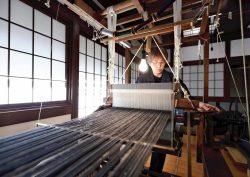14:14 JST, December 29, 2020
Half of the nation’s medical institutions were in the red in July-September and many reduced their winter bonuses, according to surveys conducted by hospital groups, as the novel coronavirus pandemic continues to put pressure on the management of medical institutions.
Exhausted nurses have been expressing anguish with many saying they are almost at their limit.
■ Urgent support needed
“We’ve been struggling for funds. The government grants have arrived too late,” said Ryota Uruno, executive director of Tokyo Kinrosya Iryokai, which operates Toukatsu Hospital in Nagareyama, Chiba Prefecture.
In August, the hospital was designated by the Chiba prefectural government as a key medical institution to treat coronavirus patients and has 10 beds in dedicated wards.
However, the number of outpatients and health checkups handled by the hospital has decreased significantly, and the cumulative deficit for the period from April to November was about ¥600 million.
The hospital reduced the summer employee bonus and was planning to do the same with the winter bonus, but after receiving complaints from staff, it paid the same amount as last year.
The central government has offered grants to key medical institutions to improve coronavirus-related procedures, but the payments have been delayed. A total of ¥472.8 billion was appropriated for the grants in the second supplementary budget for this fiscal year, but only ¥275.6 billion had been granted as of Dec. 15.
Toukatsu Hospital applied for a ¥160 million government grant for the period from August to October, but the money was not transferred until Dec. 22 — after the hospital had paid the winter bonus — because it took time for the prefectural government to complete administrative procedures.
“The burden on staff has increased. Without prompt support, we won’t be able to survive,” Uruno said.
■ Bonuses cut
The Japan Hospital Association and other groups conducted a survey in July-September to investigate the business conditions of hospitals.
Of the 1,460 hospitals that responded to the survey, 54% were in the red in July, 49% in August and 52% in September.
In another survey conducted by the Japan Municipal Hospital Association, 388 hospitals reported a total decrease of ¥47.6 billion in medical income and expenditure between June and October compared to the same period last year. Of these, 90% were for hospitals that treated COVID-19 patients.
Many hospitals have reduced employee bonuses amid the severe business conditions.
A Japan Federation of Medical Worker’s Unions survey conducted in November found that 44% of 289 hospitals reported a decrease in this year’s winter bonus from the previous year, with 31 reporting a decrease of ¥100,000 or more.
■ Crowd-funding
Some hospitals have resorted to raising funds on their own.
Moriya Keiyu Hospital in Moriya, Ibaraki Prefecture, had raised about ¥47 million through online crowdfunding as of Friday, with donations from 2,773 people.
The hospital has been treating COVID-19 patients since April. Its revenue for the period from April to August decreased by about ¥150 million compared to the previous year.
Faced with the threat of having to reduce its winter bonus, the hospital launched a crowdfunding campaign on Nov. 26, setting a target of ¥10 million.
The donations it received far exceeded the target.
The hospital will use the donations to provide allowances of up to about ¥140,000 to nurses and other workers.
“The unexpectedly large amount of support was not just for us. It was probably also intended for the entire medical community fighting against the virus,” said Moriya Keiyu Hospital Director Akira Imamura.
On Friday, the central government announced a plan to provide subsidies of up to ¥15 million per bed to hospitals treating COVID-19 patients in areas where the number of cases is rapidly increasing, to encourage medical institutions to secure more beds.
Josai University Prof. Tomotoshi Iseki, who specializes in public administration and regional medical care, said: “Delays in the provision of subsidies are a matter of life and death for hospitals. The national and local governments should establish a system to promptly provide subsidies and encourage more hospitals to treat coronavirus patients.”
Top Articles in Society
-

Man Infected with Measles May Have Come in Contact with Many People in Tokyo, Went to Store, Restaurant Around When Symptoms Emerged
-

Woman with Measles Visited Hospital in Tokyo Multiple Times Before Being Diagnosed with Disease
-

Australian Woman Dies After Mishap on Ski Lift in Nagano Prefecture
-

Foreign Snowboarder in Serious Condition After Hanging in Midair from Chairlift in Nagano Prefecture
-

Record-Breaking Snow Cripples Public Transport in Hokkaido; 7,000 People Stay Overnight at New Chitose Airport
JN ACCESS RANKING
-

Japan Institute to Use Domestic Commercial Optical Lattice Clock to Set Japan Standard Time
-

Israeli Ambassador to Japan Speaks about Japan’s Role in the Reconstruction of Gaza
-

Man Infected with Measles May Have Come in Contact with Many People in Tokyo, Went to Store, Restaurant Around When Symptoms Emerged
-

China Eyes Rare Earth Foothold in Malaysia to Maintain Dominance, Counter Japan, U.S.
-

Prudential Life Insurance Plans to Fully Compensate for Damages Caused by Fraudulent Actions Without Waiting for Third-Party Committee Review






















